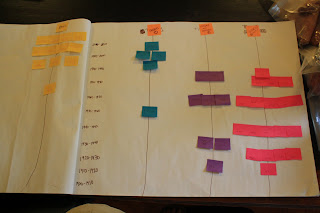Next, it was the students turn. Now that they were more familiar with the cemetery and with different symbols and motifs above the ground, we asked them to select just one trait. Before setting them lose a second time, each group was given a single color of post-its. Their objective was to find as many headstones with their chosen symbol or motif and write just one year of death on each post-it. For example, students who chose daisies (sometimes representing youth and innocence) would go headstone to headstone looking for the specific flower, and when found they would write 1938 on a single post-it, and go on to find another. Students chose hearts, roses, vines, specific types of crosses, and hunting/fishing motifs to mention a few.
As a wrap up, we set up a graph to represent the frequency of each trait by decade. In general, traits demonstrated the “battleship” curve known in seriation studies for showing the introduction of a new trait, expansion of popularity over time, and then the truncating down as the trait diminishes. Students had no problem with analogies of what trends were popular today: skinny jeans, pop stars, and symbols of wealth (aka bling).

Riders of the Purple Sage by Zane Grey
FORT HOOD, Texas – Former President George W. Bush and his wife, Laura, have visited wounded soldiers and their families after the mass shooting at Fort Hood.
The Bushes made their private visit to Fort Hood's Darnall Army Medical Center on Friday night. Bush spokesman David Sherzer said in an e-mail that the couple thanked Fort Hood's military leaders and hospital staff for the "amazing care they are providing."
No cameras, no PR, just concern for our troops.
When stories of this kind break, the weatherman becomes the most accurate part of the newscast. We know nothing right now. We know less than nothing because too much of what we’re told is wrong.
All we know is that people are dead and wounded, and families and loved ones are suffering. That’s all that matters right now. The rest is noise.
| |||||
|
Secret copyright treaty leaks. It's bad. Very bad.
The internet chapter of the Anti-Counterfeiting Trade Agreement, a secret copyright treaty whose text Obama's administration refused to disclose due to "national security" concerns, has leaked. It's bad. It says:
- * That ISPs have to proactively police copyright on user-contributed material. This means that it will be impossible to run a service like Flickr or YouTube or Blogger, since hiring enough lawyers to ensure that the mountain of material uploaded every second isn't infringing will exceed any hope of profitability.
- * That ISPs have to cut off the Internet access of accused copyright infringers or face liability. This means that your entire family could be denied to the internet -- and hence to civic participation, health information, education, communications, and their means of earning a living -- if one member is accused of copyright infringement, without access to a trial or counsel.
- * That the whole world must adopt US-style "notice-and-takedown" rules that require ISPs to remove any material that is accused -- again, without evidence or trial -- of infringing copyright. This has proved a disaster in the US and other countries, where it provides an easy means of censoring material, just by accusing it of infringing copyright.
- * Mandatory prohibitions on breaking DRM, even if doing so for a lawful purpose (e.g., to make a work available to disabled people; for archival preservation; because you own the copyrighted work that is locked up with DRM)
| |||||
|
 Amber Grafft-WeissOutreach Coordinator
Amber Grafft-WeissOutreach Coordinator
Florida Public Archaeology NetworkNortheast Region74 King StreetSt. Augustine, FL 32084Work: (904) 819-6498Cell: (904) 669-3800Fax: (904) 819-6499
This email contains CONFIDENTIAL information intended only for the use of the addressee(s) named above. If you are not the intended recipient of this email, you are hereby notified that any dissemination or copying of this email is strictly prohibited. If you have received this email in error, please notify us by reply email and delete this email from your records. Furthermore, the contents of this email do not necessarily represent official policy of Flagler College.
Here’s the rub: most people thinking about ebooks are focused on creating an electronic recreation of print books, complete with downloadable files and devices that look and feel like books. This is a bit like pointing a camera at a stage play and concluding that was the essence of filmmaking!
At O’Reilly, we’ve tried to focus not on the form of the book but on the job that it does for our customers. It teaches, it informs, it entertains. How might electronic publishing help us to advance those aims? How might we create a more effective tool that would help our customers get their job done?
It was by asking ourselves those questions that we realized the advantages of an online library available by subscription. One of the best things about online technical books is the ability to search the full text of a book. How much better would it be to be able to search across thousands of books? Safari Books Online was our answer.
Safari Books Online is the dream reference library for tech. I'd love to see something like this in the genea-world.



